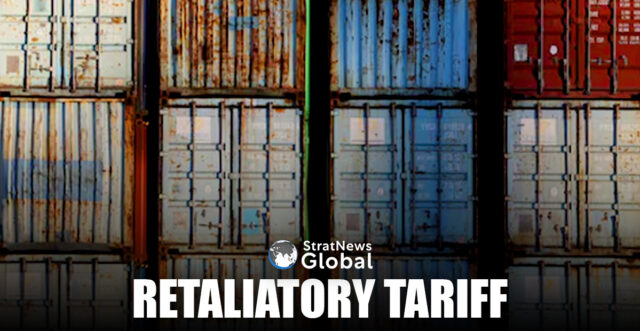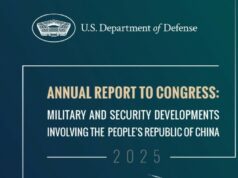China on Friday raised tariffs on U.S. imports to 125%, retaliating against President Donald Trump’s tariff hike to 145% on Chinese goods, escalating a trade war that could disrupt global supply chains.
The hike comes after the White House kept the pressure on the world’s No.2 economy and second-biggest provider of U.S. imports by singling it out for an additional tariff increase, having paused most of the “reciprocal” duties imposed on dozens of other countries.
“The U.S. imposition of abnormally high tariffs on China seriously violates international and economic trade rules, basic economic laws and common sense and is completely unilateral bullying and coercion,” China’s Finance Ministry said in a statement.
Investors had been waiting to see how Beijing would respond to Trump’s move on Wednesday to effectively raise tariffs on Chinese goods to 145% while announcing a 90-day pause on duties on dozens of other countries’ goods. The yuan slipped to levels last seen during the global financial crisis on Thursday but rebounded slightly on Friday.
Tit-For-Tat Tariffs
The tit-for-tat increases stand to make goods trade between the world’s two largest economies impossible, analysts say, with import duties above around 35% wiping out Chinese exporters’ profit margins and making American offerings in China similarly overly expensive.
Beijing indicated on Friday that this would be the last time it matched the U.S., in the event that Trump takes his tariffs any higher.
“Even if the U.S. continues to impose even higher tariffs, it would no longer have any economic significance and would go down as a joke in the history of world economics,” the Finance Ministry’s statement added.
“If the U.S. continues to play a numbers game with tariffs, China will not respond,” it added. However, it left the door open for Beijing to turn to other types of retaliation, reiterating that China would fight the U.S. to the end.
Restriction On Hollywood Films
On Thursday, Beijing said it would immediately restrict imports of Hollywood films in response to Trump’s tariff increases. Earlier this week, China focused its sights on U.S. services exports, issuing a travel advisory for citizens visiting the U.S. and an alert for students considering studying in the U.S. state of Ohio.
UBS analysts said in a note that China’s declaration that it would not retaliate in kind against any further tariff increases was “an acknowledgement that trade between the two countries has essentially been completely severed”.
Both sides now tax 100% of each other’s goods, after China increased the percentage of two-way trade it subjects to taxes from 63% on April 9, following the U.S. broadening the scope of its duties from 67% in February.
Average U.S. tariffs on Chinese exports now stand at 135%, according to the Peterson Institute for International Economics, more than 40 times higher than before the first U.S.-China trade war kicked off in 2018.
Seeking To Build Alliances
Beijing is seeking to rally trading partners to its cause.
In his first public comments on the tariffs, President Xi Jinping told Spanish Prime Minister Pedro Sanchez during a meeting in Beijing that China and the European Union should “fulfill their international responsibilities… and jointly oppose unilateral acts of bullying”, China’s state news agency Xinhua reported.
Xi begins a three-nation tour of Southeast Asia next week, aiming to consolidate ties with some of China’s closest neighbours as trade tension escalates with the United States.
Eric Orlander, co-founder of the China-Global South Project, said improved market access in areas like agriculture would likely be on the table when Xi meets his Vietnamese, Malaysian and Cambodian counterparts rather than “big free trade deals”.
“China’s best offer to Vietnam is stability. Don’t underestimate how important that is at a time like this,” Orlander added.
Chinese Commerce Minister Wang Wentao has sought to get ahead of U.S. negotiators, holding video calls this week with his counterparts from the EU and Malaysia, which is chairing ASEAN this year, as well as Saudi Arabia and South Africa, by way of reaching out to Gulf countries and the Group of 20 and BRICS nations.
Beijing and Brussels agreed on Thursday to restart talks on trade relief and to immediately carry out negotiations on electric vehicle price commitments, according to a readout of his meeting with European Commissioner for Trade and Economic Security Maros Sefcovic, meaning a truce to a longstanding spat could be forthcoming.
A rapprochement with Europe would take China’s trade war with the West back to a single front — the U.S.
“China remains open to negotiations with the U.S., but threatening and pressuring are not the right way to engage with China,” the country’s Commerce Ministry said in a separate statement.
(With inputs from Reuters)





